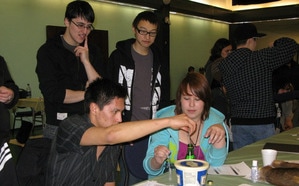Inuvialuit Settlement Region, Northwest Territories

Year(s) Funded: 2009-2010
Topic Area: Water Quality
Title: Monitoring and Surveillance of Water Borne Diseases in the Inuvialuit Settlement Region: Adapting to a Changing Climate in the North
Action: Testing that occurs routinely in the Inuvialuit Settlement Region of Northwest Territories may potentially not capture some climate change-related variation in water quality, even though the NWT has water quality standards and testing regimes in place. Moreover, yearly sampling may not capture seasonal variations in contaminant levels, and therefore it is not known for certain whether there are spikes in contaminant levels at certain times of the year, or increases in levels from year to year. The NWT has implemented a circuit rider program to train WTP operators that may address inconsistencies in the water sample collection processes undertaken in each community. The territorial government has also made available a water quality database and developed education programs and pamphlets to educate the general public.Water sources in three communities in the Inuvialuit Settlement Region, Aklavik, Tuktoyaktuk and Ulukhaktok, were sampled to identify microbes and contaminants that might have been present. It addition, the project included an educational component to introduce youth to the concept of water stewardship and their future responsibilities within the community. Results:The study tested and documented water samples for the following parameters: basic water characteristics; metals; polycyclic aromatic hydrocarbons; total extractable hydrocarbons; Polychlorinated Biphenyls (PCBs); parasites (Giardia and Cryptosporidia); and bacteria (E.coli and Salmonella, qPCR for H. pylori, sample storage for future H. pylori work). Advanced chemical testing was completed based on concerns in the community of Aklavik about barrels that were left buried in the 1950s. ICHR partnered with IRC in presenting issues around water and water stewardship to students participating in the Youth Town Hall Forum on Education. Additionally, students participated in water testing with water collected from the river by Inuvik, snow water that was melted, tap water, bottled water and mineral water. Outputs: Baseline data on water microbes and contaminants. |
